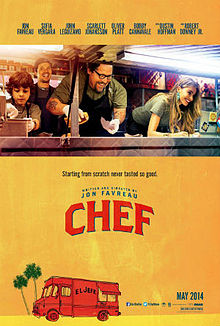
If you like the idea of good people working hard and winning, “Chef” will make a hearty meal for your soul.
Not more fake John Waynes. Not blood, guts and alien gore. Not preachy didacticism, whether the indisputable doctrine comes from god or some scowling ideologue. Just stories about people who get themselves out of unhappy situations by learning and doing better. You know, just like real life.
In his film “Chef,” currently Netflixable, Jon Favreau displays a better understanding for this kind of art than anyone I know of who is actually trying to help people change their lives for the better.
“Chef” is a true benedy in my formulation. The action moves from worse to better, as compared with a maledy, where the story moves from better to worse. Carl Casper, the chef who is the central character, is the change character, and he is most improved by the end, but virtually every one of the ‘above-the-line’ characters is better by the end of the film, which I always love to see.
The DISC synopsis is simple: Carl is a Incandescent-Driven who, after a career melt-down, discovers how to restructure his life as a Driven-Sociable instead. In less clinical terms, he learns how to be a better man and a much better father and husband by taking a food truck cross-country with his son and his most-loyal friend. Funny characters and situations, fast, fun dialogue and a man who redeems everyone around him by redeeming himself. Social media, especially Twitter, stands in as the chorus, and that’s fun just by itself.
Act II is guy’s guy stuff, which I like, too: Among themselves, the boys do all kinds of things they would never do were any woman around. Carl’s scenes bringing out the man in his son are especially moving – a deep exposition of what it means to be a man in the world.
It’s a touch long for a benedy, but I didn’t resent it. It’s tidy at the end, and people who hate happy endings will hate it – plausibly for the opposite of the reason I despise maledy. But if you like the idea of good people working hard and winning, “Chef” will make a hearty meal for your soul.















